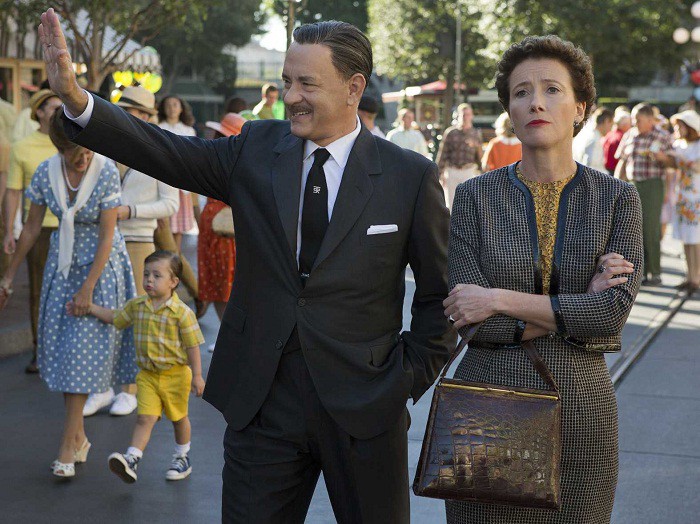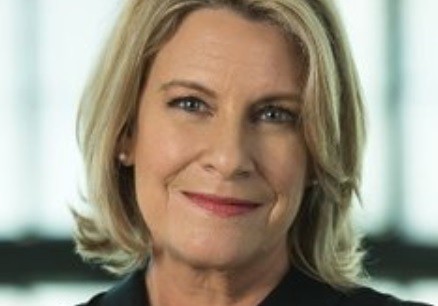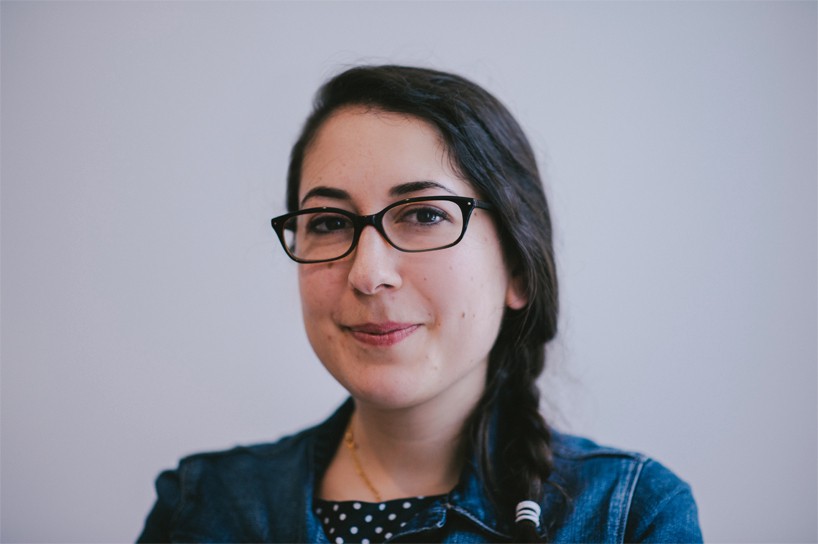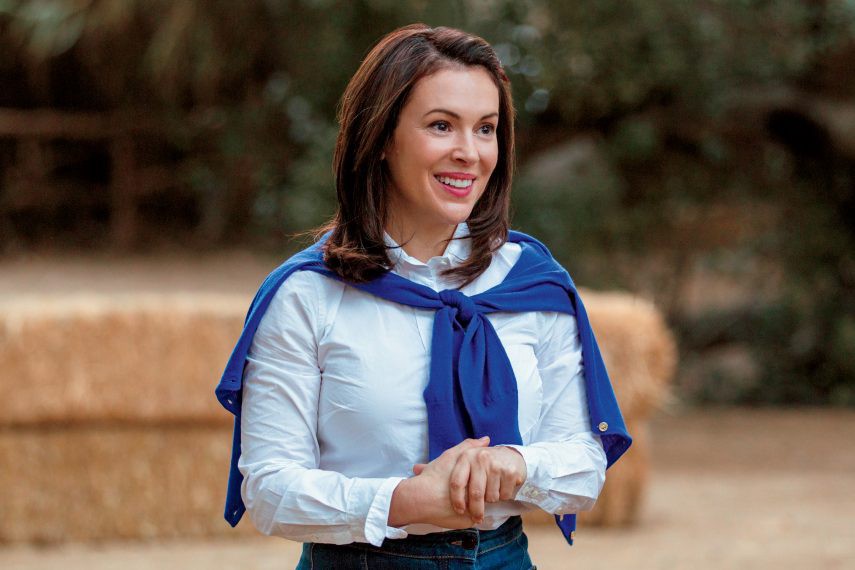Alison Owen is one of the most successful independent producers working in the UK. Her incredibly diverse list of credits includes Elizabeth, Shaun of the Dead, Jane Eyre (2011), and, most recently, Saving Mr. Banks. The development slate boasted by her shingle, Ruby Films, is bold and female-driven, with women directors attached to 50% of its announced production slates for 2014 and 2015.
Women and Hollywood met Alison at her London offices to talk about her latest film, Saving Mr. Banks, and how a female British indie producer ended up in control of the only on-screen representation of Walt Disney to date.
Can you describe Saving Mr. Banks in just a couple of sentences?
Saving Mr. Banks is an origin story about the making of Mary Poppins. It’s about the battle that Walt Disney had with [Mary Poppins author] Pamela Travers about getting the rights to [the book] and it’s a journey to discover the reasons why she wouldn’t let Disney have those rights in the first place. And, of course, it’s about his plan to change her mind.
In the film’s synopsis, P.L. Travers is described as a “curmudgeonly writer.” As a film producer, is this a type you’ve encountered?
Yes, I’ve definitely had experiences like that and I think anyone who works in the film industry has experienced the frustration of trying to get someone to change something that’s on the page to suit the screen. When you want to transcribe an idea truthfully from the page to the screen, it is not necessarily best to be particularly literal about it. It can be hard to convince people, specifically writers, of that.
You’ve produced a film about Walt Disney, the man, trying to portray and interpret Mary Poppins for the screen, while you’re also working with Disney Studios on a script that is trying to portray Walt Disney on the screen. What was your experience with Disney the studio? Were there controls in place and did any issues arise with the depiction of their founder?
They are probably the most hands-off people I’ve ever worked with, ever. It’s extraordinary, because you would presume the opposite. But I think their strategy, which was a rather smart one, was to work with me because I brought an outside project. They could see that I was determined to make the film and I’d make it without them, even if it would be a much lesser film without the permission and help.
And they knew it was a good time to make a film about their founder. Walt Disney had never been represented on film before. It was quite fortuitous that a really good script had come from outside. This is an independent movie that had been developed outside of the studio and therefore could not be accused of sanctifying or sugar-coating Walt Disney in the way it might have been if it had been developed in-house. One wouldn’t necessarily describe this as a warts-and-all-portrait, but it is not sanitized. I believe that Disney was keen to keep that feeling, which is why they agreed to fund it but remain hands-off.
Walt Disney’s daughter, Diane, passed away a week ago. Did she have an opportunity to see the film, the first depiction of her father on film?
I had a relationship with Diane and I was with the three Disney granddaughters the day before she passed away. We knew she was ill and it was very sad. Diane was very nervous about the film, as were the granddaughters. They haven’t seen it yet and they are still nervous about it, but everyone has told them that they’re going to really like it. Diane was told, “Even the Disney fans love it!” The Disney fans will know if any detail is incorrect — they’re fanatical — yet they’ve given this film their seal of approval, which is wonderful.
Can you draw any comparisons with the experience you had when you produced Sylvia, the biopic of poet Sylvia Plath starring Gwyneth Paltrow? Sylvia Plath is an an entirely different type of a person and Sylvia an entirely different type of film, but my understanding is that you did not have all of the permissions and freedoms that were afforded you on Saving Mr. Banks.
That was the toughest experience I’ve had in terms of filmmaking, at least at the beginning. The absence of rights meant it was the first time I’d started a film, maybe two or three weeks into filming, without being able to sign-off on the finance. It is really awful to be filming and not know if you can pay everybody. Nobody knows the situation [because] you’re smiling and pretending that everything is ok. It is not my way at all. I am not a fly-by-the-seat-of-your-pants producer, usually. Some people are, but I’m not. It was horrible for me.
It was horrible that the estate of Ted Hughes was being so dogmatic and angry about it as well. We’d always known that Ted’s widow, Carol, might not be helpful, but I’d had dinner with Frieda (Hughes and Plath’s daughter) a couple of times and she was really into the film, but a little way down the road she did a u-turn.
I decided to carry on making Sylvia. I believed that it was an honest portrait, that it had total integrity, and no one was trying to do anything scurrilous. The film was an attempt to draw a truthful portrait. Although Frieda had her own reasons for not wanting it to go ahead, I felt that I had the right to disagree with her, so I did. I would not have gone ahead if I’d thought anyone had a really good reason to stop the film or if I was hurting someone in any real way. I didn’t feel that in the instance of Sylvia.
In keeping with the research published recently by the BFI, you often work with the same women again and again. You worked with Gwyneth Paltrow after Sylvia when she did Proof, and your current project Suffragette shares a director with Brick Lane. Do you work with the same women because you know from experience that you can get another good film off the ground and completed? Is there safety in familiarity?
No, there’s no strategy to it whatsoever. Really, I am entirely material driven. If a project appeals to me, I will try to find the right writer and director. And that may be someone I’ve worked with before, or it may not. It may be a woman, or it may not. I guess I’m more likely to turn to a woman because the material I pick has a female perspective. I’m a woman, so why wouldn’t it be?
You quite often turn to BBC Films and you’ve co-produced with them on a number of occasions. What is your relationship with BBC Films head Christine Langan and her studio? Do you bring projects to them, or do they bring projects to you?
I almost always turn to them. I adore Christine, a beacon of the British film industry. She has amazing taste, she is supportive, she’s brilliant. Tessa Ross at Film Four is equally fantastic. I know whether something will be better off at the BBC or Film Four. There’s the odd crossover, but they’re quite distinct from one another.
When you think about producing a film that is made by women, a film that could be called a “woman’s film” — I’m thinking of Suffragette and the adaptation of Zadie Smith’s On Beauty — do you think consciously, actively about them as “women’s films”?
I would never think to myself, “I’d best get a group of women together.” Occasionally, I might think, “Wouldn’t it be nice to have a woman director for that film or that subject,” but I wouldn’t set out to find a woman director. Sometimes I’ve seen a list of writers and I’ve asked for more women to be added, but I wouldn’t ask for a female writer over the best writer.
With Suffragette, I felt that a female writer would be good, and considering the subject matter, who would be better to write the script than Abi Morgan? She was the first choice and she happens to be a woman. Similarly with Sarah Gavron (the director of Suffragette), we discovered that Sarah felt passionately about the suffragettes and had been considering ideas for a film at the same time as us. Equally, we could have had Danny Boyle directing. We didn’t actively find a team of women to make that film, but it turns out the best people for the film are all women because it’s a female subject.
There are a few public funding policies emerging across Europe that spread funds according to diversity and gender representation. In Sweden, they are giving 50% of their funding to films directed by women and 50% to films directed by men. It looks as if Ruby Films’ slate would do exceptionally well under that type of a system, but what do you think about quota systems and positive discrimination?
I think positive discrimination can work. While a culture adjusts, there can be a need for positive discrimination, but it should be temporary and reserved for transitional phases. It would help solve the lack of female directors. With directors, they stop working because they have kids and once you’re stepped off the ladder, it can be very hard to get back on again. Producers and writers can carry on while they have kids. Many directors become successful after they’ve raised their children: think of Nancy Meyers and Nora Ephron. Those women kept writing while they had kids and moved into directing when they had the time and knew they wouldn’t have to step away.
Do you have any advice to give any women screenwriters who’d like to find their script on your development slate for 2015 or 2016?
I tell writers to apply the same criteria to their work that producers will apply to it. There are only two criteria, and the script must meet both of them. One, you must feel passionately about the project and want to see it in the cinema, and two, you must be able to see a clear path that will lead to it being made. The reason it has to have both is that I’ve tried having one or the other and it has been a disaster. If you have a film that you’re not passionate about, even if you know if can be financed and distributed, you will not be invested in the project. You need to have a taste for it — you have to like it.
On the other hand, I’ve also taken on projects that I felt passionately about but that I did not know how to make. This is a quick route to banging your head against the wall and it can take a very long time to get out of the situation.
As a woman working at the top of your field, are you aware of any misconceptions about you?
Only that people tell me that they’ve heard I’m really scary, which I find hilarious.
A successful woman is a scary woman to some. On a final and less scary note, do you have a favorite woman director?
Nora Ephron was an absolute beacon of fun, wit, understanding, and complexity and she could translate all of that onto the screen, which is marvelous.
Saving Mr. Banks opens in wide release in the UK on November 29, in limited release in the U.S. on December 13 and wide on December 20th.







